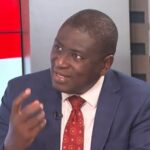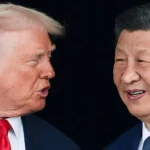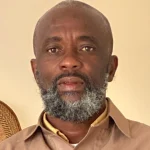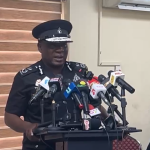Since the beginning of the Fourth Republic in 1992, Ghana’s Parliament has been dominated by governing party members.
However, in 2020, that changed when the two major political parties obtained an equal number of seats for the first time in the country’s history, with one seat going to an independent candidate.
In this split Parliament, neither the ruling New Patriotic Party (NPP) nor the opposition National Democratic Congress had a majority. The independent candidate, who had hitherto occupied the same seat on behalf of the NPP, pledged to do business with his former party, giving the ruling party a narrow majority.
Many Ghanaians hoped the unprecedented balance would empower Parliament to check the executive’s excessive control and assert its authority on citizens’ behalf, preventing questionable appointments, agreements and laws.
However, after three years of the hung Parliament, these expectations do not appear to have been met.
The 8th Parliament has survived a significant shake-up in the NDC leadership, Majority and minority walkouts and 18 NPP MPs are voluntarily exiting Parliament.
The Ghana Report is on hand to run down some of the significant events of the last year.
Major shake-up in NDC leadership in Parliament
A few weeks before the House resumed sitting in January 2023, the National Democratic Congress leadership made a major shake-up in the leadership of the Minority Caucus in Parliament.
The reshuffle saw the MP for Tamale South, Haruna Iddrisu, removed as Minority Leader and replaced by the former deputy Finance Minister, Dr Cassiel Ato Forson.
The Ellembelle MP, Emmanuel Kofi Armah Buah, replaced James Klutse Avedzi as Deputy Minority Leader.
MP for Adaklu, Kwame Agbodza, became the Chief Whip for the opposition side and was deputised by Banda MP Ahmed Ibrahim and Ada legislator Comfort Doyo Ghansah, respectively.
This was contained in a statement signed by NDC General Secretary Fifi Kwetey dated January 23, 2023.
According to the leadership of the NDC, the changes had nothing to do with the individual performances of the MPs but rather a response to the changes in the political arena.
Some MPs signed a petition to reject the party’s decision over lack of consultation. Another group of MPs also reportedly signed a different petition to endorse the party’s decision.
Subsequently, the Council of Elders of the NDC called on both sides to cease fire.
Minority clashes with Majority for trying to ‘smuggle’ new CI into business statement
An attempt by the Majority in Parliament to introduce the Public Elections (Registration of Voters) Regulations, 2023, in the business statement as one of the items to be considered by the House was botched after stiff opposition by the Minority Caucus.
The Minority argued that the Constitutional Instrument (CI) was not part of the business items that were collectively agreed on when the members of the Business Committee met the previous week.
Presenting the business statement, Mr Afenyo-Markin told the House that the Electoral Commission (EC) might lay the CI in the House the following week.
In his view, whereas Parliament had a mandate to scrutinise such instruments, it could not also obstruct a constitutional body from undertaking its work merely because the Minority had some disagreement with the institution.
“Parliament has the mandate, through its Subsidiary Legislative Committee, to have a critical look at it, but Parliament cannot obstruct or prevent a constitutional body that has a constitutional mandate to conduct public elections,” he said.
Reacting, the Minority Leader, Dr Cassiel Ato Forson, said per a draft agenda discussed during the Business Committee meeting, the CI was never discussed, and therefore, expressed shock and surprise to see the introduction of the CI.
“… Mr Speaker, at the meeting, I have a copy of the draft of the agenda we discussed. But to my surprise, I have seen an introduction of the C1 which was never discussed at the business committee meeting. But the deputy majority leader, who did not attend the business committee meeting, stood here and made a pronouncement that this was agreed upon. Mr Speaker, I am deeply disappointed in the Clerks for allowing this to be smuggled into a business statement. This can never be allowed.
“Mr Speaker, if that is the way this administration of the house, Mr Speaker, this side of the house is ready for them,” Ato Forson said.
Consequently, the First Deputy Speaker, Joseph Osei-Owusu, directed that since the instrument had not been agreed on for inclusion, it should be excluded from the business statement.
Brouhaha over approval of ministerial nominees
Muscles were flexed, and positions were entrenched following President Nana Addo Dankwa Akufo-Addo’s appointment of new ministers.
The Minority vowed to oppose the nominees in their bid to get the government to cut down on its bloated size.
The decision followed a directive by the General Secretary of the National Democratic Congress (NDC), Fifi Kwetey, for Minority members of the Appointments Committee to reject all the nominees.
But after hours of sharp disagreements that even resulted in a brief suspension on Friday, March 24, Parliament finally approved President Akufo-Addo’s six ministerial nominees, much to the shock and displeasure of the Minority.
When debates on the report of the appointments committee were concluded, it was expected that voting would take place.
But at the end of the voting process, Adansi Asokwa MP, Kobina Tahir Hammond was confirmed as Minister for Trade and Industry with 154 yes votes as against 116 NO votes, while Dr Stephen Amoah was approved as Deputy Minister for Trade and Industry after polling 146 votes against 123 NO votes.
Member of Parliament for Abetifi, Bryan Acheampong, was approved as the Minister of Food and Agriculture with 167 YES votes, and the Member of Parliament for Karaga, Mohammed Amin Adam, was okayed as Minister of State at the Finance Ministry with 152 YES votes.
Stephen Asamoah Boateng was approved as the new Minister for Religious and Chieftaincy Affairs, while Osei Bonsu Amoah headed to the Ministry of Local Government and Rural Development as Minister of State, having garnered 149 YES votes.
Minority MPs boycott Parliament to support Gyakye Quayson in court
Parliamentary business was in limbo as the Minority Caucus boycotted sittings to support the Member of Parliament for Assin North, James Gyakye Quayson, for the fourth time in court.
Members of the Caucus disclosed their decision to boycott Parliamentary business on Quayson’s trial days when he was sworn in on July 4.
The members carried through with the threats, and their actions hindered parliamentary proceedings, with the Speaker, Alban Bagbin, cautioning the Caucus that the action was against the Standing Orders of the House.
Members of the public, including some legislators, also expressed dissatisfaction with the continuous absence of the Caucus from Parliament to show solidarity with their colleague who is facing criminal prosecution.
Though many appeals were extended to the Caucus to rescind its decision, it insisted that the action would only be halted if the ongoing criminal case against its colleague, James Gyakye Quayson, was dropped.
Majority stages walkout during the approval of the 2024 budget
The Majority in Parliament on November 29, 2023, staged a walkout ahead of the approval of the 2024 budget.
The boycott came about after the Majority and the Minority Leaders had taken turns to wrap up a week-long debate and a presentation by the Minister of Finance in the House.
The Speaker of Parliament then put a voice vote on the motion and declared that the “Ayes” by the Majority had it.
But the Speaker’s ruling was challenged by the Minority on the grounds that there was no distinctive difference between the “Ayes” and the “Nays” by the Minority.
Invoking Order 113 (2), the Deputy Minority Leader, Emmanuel Armah-Kofi Buah, called for a headcount or division.
The Speaker heeded the request by the Deputy Minority leader and instructed the Clerks at the Table to conduct the headcount, saying that the names of each MP would be called out for him or her to stand up.
But the Majority strongly objected to the Speaker’s decision on the grounds that he had earlier declared the “Ayes” in favour of the motion and should stand by his decision and disallow the headcount.
Consequently, members of the Majority Caucus staged a walkout from the Chamber, disrupting the approval process for the budget.
However, when the House was due to approve the budget the following day, most of the members of the Majority Caucus failed to show up.
They were, however, represented by the Majority Leader, Osei Kyei-Mensah-Bonsu; the Deputy Majority Leader, Alexander Afenyo-Markin; and the Majority Chief Whip, Frank Annoh-Dompreh.
Minority Blocks LI To Restrict Importation Of 22 Items
The Minority in Parliament, on four occasions, blocked the laying of a Legislative Instrument seeking to restrict the importation of 22 items.
The Import and Export (Restrictions on Importation of Selected Strategic Products) Regulations, 2023, seek to restrict the import of products such as rice, cement, poultry, sugar, fruit juice, and margarine, among others.
The Trade Minister, Kobina Tahir Hammond, who was pushing this regulation, hoped it would help the cedi appreciate as well as help grow local industries.
Per the proposed regulation, any person seeking to import the selected products will require permission from the Trade Minister.
However, the Minority said it was not against the restrictions on importations, but that same must be done with tact by ensuring that the country had enough production capacity to make up for the demand, arguing that the necessary consultations had not been done to inculcate the views of stakeholders into the draft Instrument before it was laid.
However, on December 8, the government declared the suspension of the bill, thereby putting a stop to its planned passage.
18 NPP MPs Voluntarily Exit Parliament
In a surprising turn of events, 18 legislators from the Majority Caucus of the ruling New Patriotic Party (NPP) signalled that they will not be seeking reelection in the next parliamentary elections in 2024.
This voluntary exit generated significant speculation and sparked discussions about the future of the NPP in the coming years.
Among the noteworthy MPs opting not to seek reelection are prominent figures such as Majority Leader Osei Kyei-Mensah-Bonsu (Suame), First Deputy Speaker Joe Osei Owusu (Bekwai), Atta Akyea (Abuakwa South), Joe Ghartey (Essikado Ketan), and Ken Agyapong (Assin Central).
Their decision undoubtedly leaves a void in the party’s leadership and parliamentary representation.
Other MPs who have decided to step down include Dan Botwe (Okere), Kwasi Amoako-Atta (Atiwa West), Dr Kwaku Afriyie (Sefwi Wiaso), and Emmanuel Marfo (Oforikrom).
Additionally, Benito Owusu-Bio (Atwima Nwabiagya), Carlos Ahenkora (Tema West), Nana Kwasi Adjei Boateng (New Juabeng North), William Owuraku Aidoo (Afigya Kwabre South), Johnson Adu (Ahafo Ano South West), Francis Manu-Adabor (Ahafo Ano South-East), Suleman Sanid (Ahafo Ano North), Kojo Kum (Ahanta West), and Francisca Oteng (Kwabre East) are among those opting not to seek reelection.
The reasons behind their decision remain unclear, with speculation ranging from potential retirements from politics to pursuing alternative professional opportunities or taking a break from the demanding nature of parliamentary life.
Internal dynamics within the NPP or personal considerations may also have influenced their decision-making process.
The departure of these 18 MPs will undoubtedly impact the NPP’s prospects. Filling these vacant seats and ensuring a smooth leadership transition within their ranks will be imperative.
















